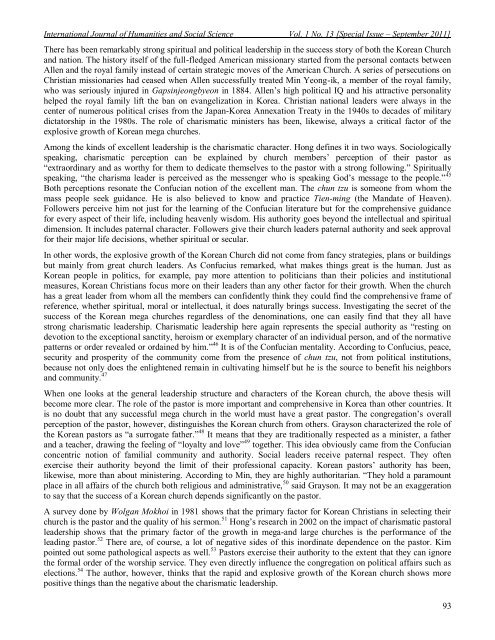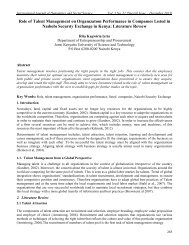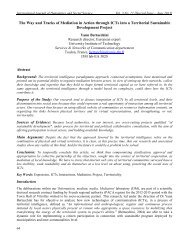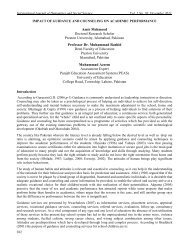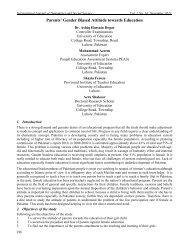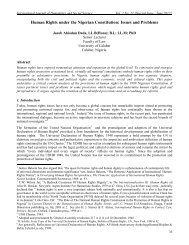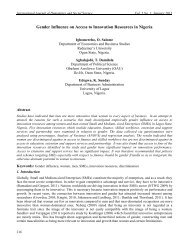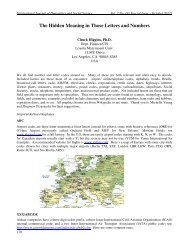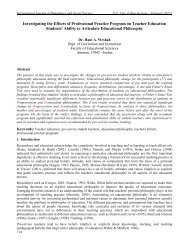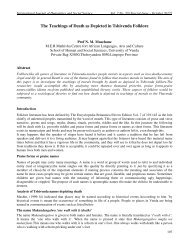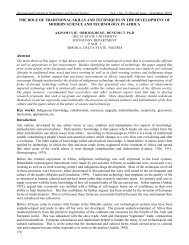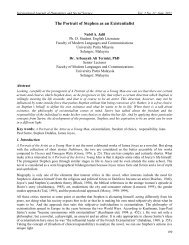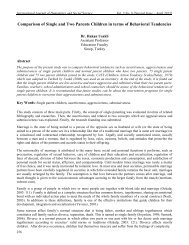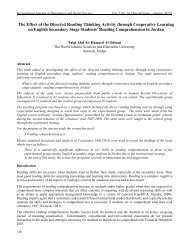Revisiting the Confucian Norms in Korean Church Growth
Revisiting the Confucian Norms in Korean Church Growth
Revisiting the Confucian Norms in Korean Church Growth
You also want an ePaper? Increase the reach of your titles
YUMPU automatically turns print PDFs into web optimized ePapers that Google loves.
International Journal of Humanities and Social Science Vol. 1 No. 13 [Special Issue – September 2011]<br />
There has been remarkably strong spiritual and political leadership <strong>in</strong> <strong>the</strong> success story of both <strong>the</strong> <strong>Korean</strong> <strong>Church</strong><br />
and nation. The history itself of <strong>the</strong> full-fledged American missionary started from <strong>the</strong> personal contacts between<br />
Allen and <strong>the</strong> royal family <strong>in</strong>stead of certa<strong>in</strong> strategic moves of <strong>the</strong> American <strong>Church</strong>. A series of persecutions on<br />
Christian missionaries had ceased when Allen successfully treated M<strong>in</strong> Yeong-ik, a member of <strong>the</strong> royal family,<br />
who was seriously <strong>in</strong>jured <strong>in</strong> Gaps<strong>in</strong>jeongbyeon <strong>in</strong> 1884. Allen‟s high political IQ and his attractive personality<br />
helped <strong>the</strong> royal family lift <strong>the</strong> ban on evangelization <strong>in</strong> Korea. Christian national leaders were always <strong>in</strong> <strong>the</strong><br />
center of numerous political crises from <strong>the</strong> Japan-Korea Annexation Treaty <strong>in</strong> <strong>the</strong> 1940s to decades of military<br />
dictatorship <strong>in</strong> <strong>the</strong> 1980s. The role of charismatic m<strong>in</strong>isters has been, likewise, always a critical factor of <strong>the</strong><br />
explosive growth of <strong>Korean</strong> mega churches.<br />
Among <strong>the</strong> k<strong>in</strong>ds of excellent leadership is <strong>the</strong> charismatic character. Hong def<strong>in</strong>es it <strong>in</strong> two ways. Sociologically<br />
speak<strong>in</strong>g, charismatic perception can be expla<strong>in</strong>ed by church members‟ perception of <strong>the</strong>ir pastor as<br />
“extraord<strong>in</strong>ary and as worthy for <strong>the</strong>m to dedicate <strong>the</strong>mselves to <strong>the</strong> pastor with a strong follow<strong>in</strong>g.” Spiritually<br />
speak<strong>in</strong>g, “<strong>the</strong> charisma leader is perceived as <strong>the</strong> messenger who is speak<strong>in</strong>g God‟s message to <strong>the</strong> people.” 45<br />
Both perceptions resonate <strong>the</strong> <strong>Confucian</strong> notion of <strong>the</strong> excellent man. The chun tzu is someone from whom <strong>the</strong><br />
mass people seek guidance. He is also believed to know and practice Tien-m<strong>in</strong>g (<strong>the</strong> Mandate of Heaven).<br />
Followers perceive him not just for <strong>the</strong> learn<strong>in</strong>g of <strong>the</strong> <strong>Confucian</strong> literature but for <strong>the</strong> comprehensive guidance<br />
for every aspect of <strong>the</strong>ir life, <strong>in</strong>clud<strong>in</strong>g heavenly wisdom. His authority goes beyond <strong>the</strong> <strong>in</strong>tellectual and spiritual<br />
dimension. It <strong>in</strong>cludes paternal character. Followers give <strong>the</strong>ir church leaders paternal authority and seek approval<br />
for <strong>the</strong>ir major life decisions, whe<strong>the</strong>r spiritual or secular.<br />
In o<strong>the</strong>r words, <strong>the</strong> explosive growth of <strong>the</strong> <strong>Korean</strong> <strong>Church</strong> did not come from fancy strategies, plans or build<strong>in</strong>gs<br />
but ma<strong>in</strong>ly from great church leaders. As Confucius remarked, what makes th<strong>in</strong>gs great is <strong>the</strong> human. Just as<br />
<strong>Korean</strong> people <strong>in</strong> politics, for example, pay more attention to politicians than <strong>the</strong>ir policies and <strong>in</strong>stitutional<br />
measures, <strong>Korean</strong> Christians focus more on <strong>the</strong>ir leaders than any o<strong>the</strong>r factor for <strong>the</strong>ir growth. When <strong>the</strong> church<br />
has a great leader from whom all <strong>the</strong> members can confidently th<strong>in</strong>k <strong>the</strong>y could f<strong>in</strong>d <strong>the</strong> comprehensive frame of<br />
reference, whe<strong>the</strong>r spiritual, moral or <strong>in</strong>tellectual, it does naturally br<strong>in</strong>gs success. Investigat<strong>in</strong>g <strong>the</strong> secret of <strong>the</strong><br />
success of <strong>the</strong> <strong>Korean</strong> mega churches regardless of <strong>the</strong> denom<strong>in</strong>ations, one can easily f<strong>in</strong>d that <strong>the</strong>y all have<br />
strong charismatic leadership. Charismatic leadership here aga<strong>in</strong> represents <strong>the</strong> special authority as “rest<strong>in</strong>g on<br />
devotion to <strong>the</strong> exceptional sanctity, heroism or exemplary character of an <strong>in</strong>dividual person, and of <strong>the</strong> normative<br />
patterns or order revealed or orda<strong>in</strong>ed by him.” 46 It is of <strong>the</strong> <strong>Confucian</strong> mentality. Accord<strong>in</strong>g to Confucius, peace,<br />
security and prosperity of <strong>the</strong> community come from <strong>the</strong> presence of chun tzu, not from political <strong>in</strong>stitutions,<br />
because not only does <strong>the</strong> enlightened rema<strong>in</strong> <strong>in</strong> cultivat<strong>in</strong>g himself but he is <strong>the</strong> source to benefit his neighbors<br />
and community. 47<br />
When one looks at <strong>the</strong> general leadership structure and characters of <strong>the</strong> <strong>Korean</strong> church, <strong>the</strong> above <strong>the</strong>sis will<br />
become more clear. The role of <strong>the</strong> pastor is more important and comprehensive <strong>in</strong> Korea than o<strong>the</strong>r countries. It<br />
is no doubt that any successful mega church <strong>in</strong> <strong>the</strong> world must have a great pastor. The congregation‟s overall<br />
perception of <strong>the</strong> pastor, however, dist<strong>in</strong>guishes <strong>the</strong> <strong>Korean</strong> church from o<strong>the</strong>rs. Grayson characterized <strong>the</strong> role of<br />
<strong>the</strong> <strong>Korean</strong> pastors as “a surrogate fa<strong>the</strong>r.” 48 It means that <strong>the</strong>y are traditionally respected as a m<strong>in</strong>ister, a fa<strong>the</strong>r<br />
and a teacher, draw<strong>in</strong>g <strong>the</strong> feel<strong>in</strong>g of “loyalty and love” 49 toge<strong>the</strong>r. This idea obviously came from <strong>the</strong> <strong>Confucian</strong><br />
concentric notion of familial community and authority. Social leaders receive paternal respect. They often<br />
exercise <strong>the</strong>ir authority beyond <strong>the</strong> limit of <strong>the</strong>ir professional capacity. <strong>Korean</strong> pastors‟ authority has been,<br />
likewise, more than about m<strong>in</strong>ister<strong>in</strong>g. Accord<strong>in</strong>g to M<strong>in</strong>, <strong>the</strong>y are highly authoritarian. “They hold a paramount<br />
place <strong>in</strong> all affairs of <strong>the</strong> church both religious and adm<strong>in</strong>istrative, 50 said Grayson. It may not be an exaggeration<br />
to say that <strong>the</strong> success of a <strong>Korean</strong> church depends significantly on <strong>the</strong> pastor.<br />
A survey done by Wolgan Mokhoi <strong>in</strong> 1981 shows that <strong>the</strong> primary factor for <strong>Korean</strong> Christians <strong>in</strong> select<strong>in</strong>g <strong>the</strong>ir<br />
church is <strong>the</strong> pastor and <strong>the</strong> quality of his sermon. 51 Hong‟s research <strong>in</strong> 2002 on <strong>the</strong> impact of charismatic pastoral<br />
leadership shows that <strong>the</strong> primary factor of <strong>the</strong> growth <strong>in</strong> mega-and large churches is <strong>the</strong> performance of <strong>the</strong><br />
lead<strong>in</strong>g pastor. 52 There are, of course, a lot of negative sides of this <strong>in</strong>ord<strong>in</strong>ate dependence on <strong>the</strong> pastor. Kim<br />
po<strong>in</strong>ted out some pathological aspects as well. 53 Pastors exercise <strong>the</strong>ir authority to <strong>the</strong> extent that <strong>the</strong>y can ignore<br />
<strong>the</strong> formal order of <strong>the</strong> worship service. They even directly <strong>in</strong>fluence <strong>the</strong> congregation on political affairs such as<br />
elections. 54 The author, however, th<strong>in</strong>ks that <strong>the</strong> rapid and explosive growth of <strong>the</strong> <strong>Korean</strong> church shows more<br />
positive th<strong>in</strong>gs than <strong>the</strong> negative about <strong>the</strong> charismatic leadership.<br />
93


